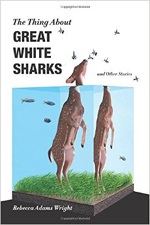 |
Wright's stories take place everywhere and anywhere. There is Post-World War II Poland, and there is a jungle in which simple letters can be taken away from you when you talk. There are orchids that seek retribution for their owner and caretaker, there are tigers waiting to be tamed. It doesn't matter where or what takes place in each of these stories, they all end with the most human of dilemmas. This is what separates Wright from many eithers; she doesn't get caught up in the flash of the story.
The title piece shows this skill beautifully. In a world where people must fight against increasingly dangerous animals, it would be easy to see where the story could lead. Our narrator could go out the way a gladiator should, or destroy the very facility that is more dangerous than helpful. It would be easy for a writer to muddle the plot, given the possibilities Wright creates. But she skillfully weaves a tension beyond the world she creates. It's a world few would want to live in, a world, however, that could easily happen. But the true tension isn't when we are mere inches away from a mammoth shark determined to devour us, it's that moment of understanding what's best for those around us and the opportunity to make the best decision. That is the connection between all of these stories—no matter what happens, the characters are as human as you and I.
Although this collection contains fifteen stories, it's amazing how limitless Wright's abilities to create new and exciting settings seem. There is very little overlap, if any. Wright's stories are as thoughtful as the robotic dogs of "Sheila," as inviting as words are to the creatures in the jungles of "Aleph Bat," and as eerie as the Kierkegaard facility in the title story. But there's a reason to be frightened and still feel that need to get lost. It's something familiar to us. Humanity looks the same no matter where you place it, no matter where it is.
|
 |





